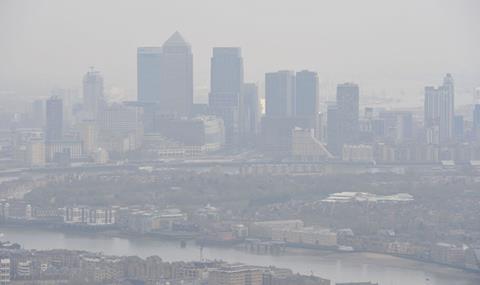
A taskforce of MPs has claimed the government is failing to provide leadership on the controversial issue of clean air zones (CAZs), which many hauliers fear will put them out of business.
Improving Air Quality, a joint report from four Select Committees, published today (15 March) also labels the government’s response to the UK’s ‘air quality catastrophe’ inadequate and calls for immediate, bold action.
Coming after the third defeat of the government’s plans to address the UK’s illegal air pollution by Client Earth, the committee MPs are equally damning in their appraisal of the plan.
Amongst a raft of proposals, the MPs state the “government is failing to provide clear messaging and national leadership on the issue of clean air zones”.
Pointing out that government policy is contradictory to its own technical report, which advocated charging CAZs to drive behavioural change, it adds “this lack of clarity is causing confusion and hampering councils’ ability to tackle air pollution as quickly as possible”.
The committees also call on the DfT and Defra to clarify how they will ensure that CAZs will not simply displace polluting vehicles to areas where monitoring is more limited.

Crucially, the report calls for robust economic assessments and support for local communities and businesses – quoting the FTA’s testimony that the government’s plan place ‘too great a burden on business in towns and cities, especially SMEs’ which often rely on vans and HGVs – and providing those affected with more time or resources to upgrade their vehicle fleets.
Road transport business in Leeds have already expressed their concerns that the city’s CAZ will ruin them as customers look for cheaper alternatives outside the zone. The issue prompted seven trade associations to write to the government recently urging action to mitigate the impact of the CAZs.
The RHA meanwhile has pointed out that the euro-6 limit most, if not all, zones will demand is set to hammer second hand truck values for euro-5 and below across the country.
Neil Parish, chairman of the Environment Food and Rural Affairs Committee, said: “The government’s latest plan does not present an effective response to the scale of the air quality catastrophe in the UK.
“We are concerned that the government is treating air quality as a box-ticking exercise. Real change will require bold, meaningful action. We are calling on government to develop a properly resourced support scheme available to all councils struggling with air quality.”
Lilian Greenwood, chairwoman of the Transport Select Committee, said: “Transport is the key to improving air quality, but it requires real political leadership and co-ordinated action from the government and local authorities.

“The solution isn’t just about reducing the pollution each vehicle produces, we also need policies that will reduce our reliance on cars. This requires more urgency, imagination and innovation than is being demonstrated by the government, local councils or transport service providers.”
However, the joint report is however about endorsing calls for scrappage schemes - for example as made by London mayor Sadiq Khan to support affected small businesses - and requests that Defra publish its analysis of scrappage scheme consultation responses instead.
Improving Air Quality – key recommendations include:
- Require the automobile industry to contribute to a new clean air fund, following the 'polluter pays' principle
- Bring forward the date by which manufacturers must end the sale of conventional petrol and diesel cars, in line with more ambitious commitments from around the world
- Introduce a Clean Air Act to improve existing legislation and enshrine the right to clean air in UK law
- Offer direction, financial resources, and technical support to the 45 local authority areas which breach NO2 limit levels but are not included under the current action framework
- Take greater account of the costs of air pollution when establishing taxation and spending policy
- Ensure that [electric] charging infrastructure addresses strategic needs and prioritises air quality hotspots














